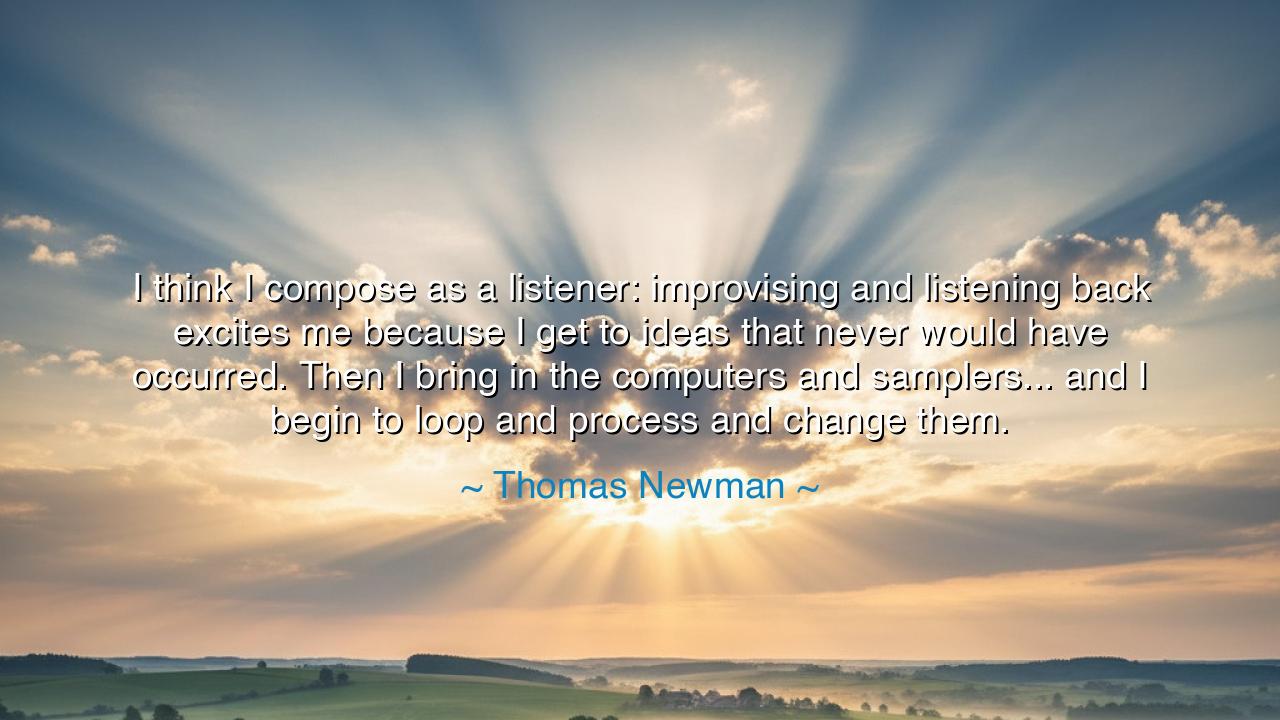
I think I compose as a listener: improvising and listening back
I think I compose as a listener: improvising and listening back excites me because I get to ideas that never would have occurred. Then I bring in the computers and samplers... and I begin to loop and process and change them.






The composer Thomas Newman, a master of modern sound and emotion, once said: “I think I compose as a listener: improvising and listening back excites me because I get to ideas that never would have occurred. Then I bring in the computers and samplers... and I begin to loop and process and change them.” These words, gentle and humble though they may seem, carry the wisdom of an artist who has learned the rhythm of creation—the dance between intuition and technology, instinct and craft, chaos and control. In this single reflection lies a philosophy not only of music, but of life itself: that to create something truly alive, one must both act and listen, both build and reflect.
In the ancient world, the greatest artisans, poets, and musicians spoke of creation as a conversation between the human soul and something greater. The sculptor Pygmalion, in the old myth, carved his statue not from design alone, but from listening to the marble—watching, feeling, waiting until the figure within revealed itself. Thomas Newman, too, speaks of this sacred act of listening. When he says, “I compose as a listener,” he means that creation is not the imposition of will upon silence, but the discovery of beauty already hidden within it. He listens to what the music wants to become. He allows his art to breathe, to evolve, to surprise him. For even the creator must sometimes be the student of his own creation.
His process begins with improvisation, that act of divine spontaneity that the ancients would have called inspiration—the breath of the Muse. To improvise is to step into the unknown, to trust one’s hands, heart, and instincts to find meaning in motion. Newman listens back to these improvisations, hearing in them sparks of truth that his conscious mind alone could not have conceived. This is the mystery of the creative act: that sometimes the truest ideas come not from the thinker, but from the space between thought and silence. In his own way, Newman channels the same wisdom that guided the poets of Greece or the mystics of the East: that creativity is not conquest—it is communion.
And then, like the alchemists of old who turned metal into gold, Thomas Newman brings in the computers and samplers, the tools of his age. These are the instruments of transformation, where raw emotion becomes refined sound. The looping, the processing, the changing—these are not mere technical acts, but modern rituals of creation. The ancients used the hammer and chisel; Newman uses the digital wave and the loop. Yet the spirit is the same: to take the spontaneous pulse of life and give it form. His blending of the organic and the synthetic mirrors the harmony between the natural world and the mechanical one—an eternal balance that defines the modern age of art.
Consider, for a moment, the story of Leonardo da Vinci, who would sit for hours watching the play of light upon water, or the flight of birds across the sky. His genius lay not in invention alone, but in observation—in listening to the world. From that listening, he drew insight, and from that insight, creation. So too with Newman: before the composition comes the listening, before the perfection comes the play. The truest ideas, whether in art, philosophy, or invention, arise not from forcing the mind to work, but from allowing the heart to hear.
In Newman’s words, we also find a lesson about humility. To “compose as a listener” is to accept that creation is a partnership. It is to acknowledge that genius is not domination, but dialogue. Too often, men and women of ambition strive to control every detail, to master every outcome—but the wise know that mastery lies in surrendering to the process. The artist, like the philosopher, must let go of ego long enough to be surprised by what he finds. For as Newman teaches, the greatest beauty often appears when we stop trying to make it appear.
And so, let this be the lesson: in your work, in your art, in your life—listen. Do not only act; reflect. Do not only speak; hear. For creation without listening is noise, but creation born of listening becomes music. Whether you are composing a symphony, building a home, or shaping your destiny, remember Newman’s truth: that ideas of true power come not from control, but from openness. Bring your tools, your knowledge, your technology—but never lose the sacred ear that hears the whisper beneath the surface of things.
Thus, Thomas Newman’s words are not only about music—they are about harmony. He reminds us that every act of making is also an act of discovery. The loop and the line, the silence and the sound, the human and the machine—all become one when the creator learns to listen. And when we, too, learn to live as listeners—attuned to the music within and around us—we shall find that life itself, like his compositions, becomes not chaos, but song.






AAdministratorAdministrator
Welcome, honored guests. Please leave a comment, we will respond soon